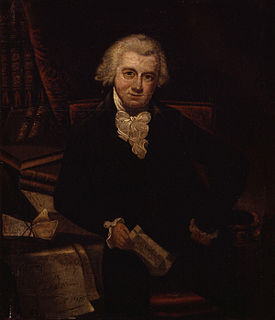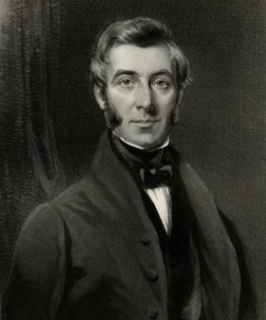External links
| Works |
|
|---|---|
| Related |
|
Thoughts and Details on Scarcity, Originally Presented to the Right Hon. William Pitt, in the month of November, 1795 is a memorandum written by the Whig MP Edmund Burke to the Prime Minister of Great Britain William Pitt the Younger. It was published posthumously in 1800, along with an unfinished letter Burke was writing to the Secretary to the Board of Agriculture, Arthur Young.
In the memorandum Burke claimed that it was not the government's responsibility to provide for the necessities of life and that labour is a commodity which will rise and fall according to the laws of supply and demand. Whenever people fall on hard times it should be left to private charity rather than state aid to alleviate their suffering. Burke further claimed that the laws of commerce were the laws of nature and therefore the laws of God. He accepted that there were exceptions to these rules and he set out what he believed should be the limits:
That the State ought to confine itself to what regards the State, or the creatures of the State, namely, the exterior establishment of its religion; its magistracy; its revenue; its military force by sea and land; the corporations that owe their existence to its fiat; in a word, to every thing that is truly and properly public, to the public peace, to the public safety, to the public order, to the public prosperity.
Samuel Whitbread, a parliamentary ally of Burke's rival Charles James Fox, introduced a Bill on 9 December 1795 to enable magistrates to set minimum wages for agricultural labourers. Burke's letter to Young likely grew out of his opposition to this Bill. [1]
This tract was often praised by the Radical and Liberal MP and anti-Corn Law activist, Richard Cobden. [2]

Edmund Burke was an Irish-born British statesman, economist, and philosopher. Born in Dublin, Burke served as a member of parliament (MP) between 1766 and 1794 in the House of Commons of Great Britain with the Whig Party.

The Corn Laws were tariffs and other trade restrictions on imported food and corn enforced in the United Kingdom between 1815 and 1846. The word corn in British English denotes all cereal grains, including wheat, oats and barley. They were designed to keep corn prices high to favour domestic producers, and represented British mercantilism. The Corn Laws blocked the import of cheap corn, initially by simply forbidding importation below a set price, and later by imposing steep import duties, making it too expensive to import it from abroad, even when food supplies were short.

Charles James Fox, styled The Honourable from 1762, was a prominent British Whig statesman whose parliamentary career spanned 38 years of the late 18th and early 19th centuries. He was the arch-rival of the Tory politician William Pitt the Younger; his father Henry Fox, 1st Baron Holland, a leading Whig of his day, had similarly been the great rival of Pitt's famous father, William Pitt, 1st Earl of Chatham.

George Grenville was a British Whig statesman who rose to the position of Prime Minister of Great Britain. Grenville was born into an influential political family and first entered Parliament in 1741 as an MP for Buckingham. He emerged as one of Cobham's Cubs, a group of young members of Parliament associated with Lord Cobham.

John Bright was a British Radical and Liberal statesman, one of the greatest orators of his generation and a promoter of free trade policies.

Richard Cobden was an English Radical and Liberal politician, manufacturer, and a campaigner for free trade and peace. He was associated with the Anti-Corn Law League and the Cobden–Chevalier Treaty.

The Anti-Corn Law League was a successful political movement in Great Britain aimed at the abolition of the unpopular Corn Laws, which protected landowners’ interests by levying taxes on imported wheat, thus raising the price of bread at a time when factory-owners were trying to cut wages. The League was a middle-class nationwide organisation that held many well-attended rallies on the premise that a crusade was needed to convince parliament to repeal the corn laws. Its long-term goals included the removal of feudal privileges, which it denounced as impeding progress, lowering economic well-being, and restricting freedom. The League played little role in the final act in 1846 when Sir Robert Peel led the successful battle for repeal. However, its experience provided a model that was widely adopted in Britain and other democratic nations to demonstrate the organisation of a political pressure group with the popular base.

An Inquiry into the Nature and Causes of the Wealth of Nations, generally referred to by its shortened title The Wealth of Nations, is the magnum opus of the Scottish economist and moral philosopher Adam Smith. First published in 1776, the book offers one of the world's first collected descriptions of what builds nations' wealth, and is today a fundamental work in classical economics. By reflecting upon the economics at the beginning of the Industrial Revolution, the book touches upon such broad topics as the division of labour, productivity, and free markets.

James Edwin Thorold Rogers, known as Thorold Rogers, was an English economist, historian and Liberal politician who sat in the House of Commons from 1880 to 1886. He deployed historical and statistical methods to analyse some of the key economic and social questions in Victorian England. As an advocate of free trade and social justice he distinguished himself from some others within the English Historical School.

William Wentworth-Fitzwilliam, 4th Earl Fitzwilliam, PC, styled Viscount Milton until 1756, was a British Whig statesman of the late 18th and early 19th centuries. In 1782 he inherited the estates of his uncle Charles Watson-Wentworth, 2nd Marquess of Rockingham, making him one of the richest people in Britain. He played a leading part in Whig politics until the 1820s.

John Baker Holroyd, 1st Earl of Sheffield was an English politician who came from a Yorkshire family, a branch of which had settled in the Kingdom of Ireland.

William Drennan was an Irish physician and writer who moved the formation in Belfast and Dublin of the Society of United Irishmen. He was author of the Society's original "test" which, in the cause of representative government, committed "Irishmen of every religious persuasion" to a "brotherhood of affection". Drennan had been active in the Irish Volunteer movement and achieved renown with addresses to the public as his "fellow slaves" and to the British Viceroy urging "full and final" Catholic emancipation. After the suppression of the 1798 Rebellion, he sought to advance democratic reform through his continued journalism and through education. With other United Irish veterans, Drennan founded the Belfast [later the Royal Belfast] Academical Institution. As a poet, he is remembered for his eve-of-rebellion When Erin First Rose (1795) with its reference to Ireland as the "Emerald Isle"

John Reeves was a legal historian, civil servant, British magistrate, conservative activist, and the first Chief Justice of Newfoundland. In 1792 he founded the Association for Preserving Liberty and Property against Republicans and Levellers, for the purpose suppressing the "seditious publications" authored by British supporters of the French Revolution—most famously, Thomas Paine's Rights of Man. Because of his counter-revolutionary actions he was regarded by many of his contemporaries as "the saviour of the British state"; in the years after his death, he was warmly remembered as the saviour of ultra-Toryism.
Sonnets on Eminent Characters or Sonnets on Eminent Contemporaries is an 11-part sonnet series created by Samuel Taylor Coleridge and printed in the Morning Chronicle between 1 December 1794 and 31 January 1795. Although Coleridge promised to have at least 16 poems within the series, only one addition poem, "To Lord Stanhope", was published.

Letters on a Regicide Peace or Letters ... on the Proposals for Peace with the Regicide Directory of France were a series of four letters written by Edmund Burke during the 1790s in opposition to Prime Minister William Pitt's seeking of peace with the revolutionary French Directorate. It was completed and published in 1796.
John Bowles was an English barrister and author. He is known as an opponent of Jacobinism, a prominent conservative writer after the French Revolution.
Edward Tatham (1749–1834) was an English college head, clergyman and controversialist, Rector of Lincoln College, Oxford from 1792 to his death.

Henry Ashworth was an English cotton manufacturer, friend of Richard Cobden, and founding member of the Anti-Corn Law League.

Emma Jane Catherine Cobden, known as Jane Cobden, was a British Liberal politician who was active in many radical causes. A daughter of the Victorian reformer and statesman Richard Cobden, she was an early proponent of women's rights, and in 1889 was one of two women elected to the inaugural London County Council. Her election was controversial; legal challenges to her eligibility hampered and eventually prevented her from serving as a councillor.
The 1795 food riots are known as the revolt of the housewives, a term coined by John Lawrence Hammond and Barbara Hammond for a series of food riots and disturbances in England in 1795 arising out of exceptional food scarcity, in which women played conspicuous roles.